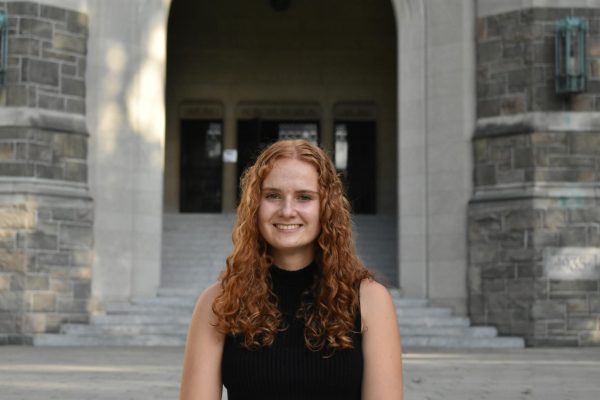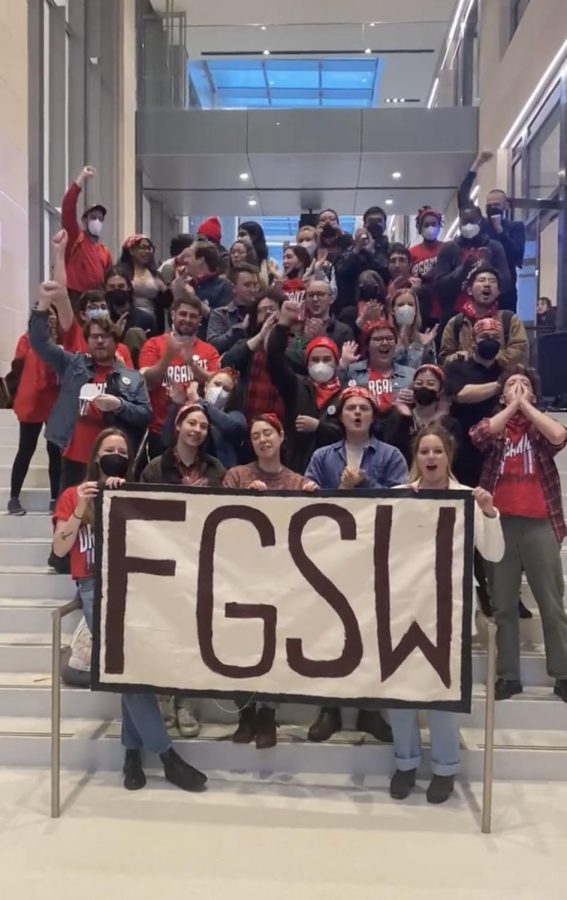Fordham’s Graduate Student Workers Vote For Union
On April 7, Fordham’s Graduate Student Workers (FGSW) voted 229-15 in favor of the creation of a union during a National Labor Relations Board (NLRB) vote. The union is created in collaboration with the Communications Workers of America.
During a NLRB vote, workers participate in a formal voting process to approve a union or not. If the majority of votes go in favor of the union, the board will officially recognize the union.
By FGSW’s vote going in their favor, the graduate student union will now be recognized by the board as an official and exclusive bargaining unit. The vote was held in the Rose Hill commons in the McShane Center.
After voting concluded, members of FGSW waited in the student center’s gallery for organizers to come down and announce the result.
The announcement of the final vote count was met with cheers from the group.
For many in FGSW, this marks a huge accomplishment and positive step in the union’s development.
“Euphoric is an understatement for how I feel. It’s surreal. After months and months of hard work, late nights, lots of meetings, just labor off the clock. It all came to the result we wanted, a union. Really excited for what this holds in store for us and the future for having a union,” said Amanda Esau, a member of FGSW’s organizing committee.
For other members, this is a positive indication for the union because it shows unity among graduate student workers as well as wide-spread support.
“We’re in a really strong position to go into bargaining with the university, and we have the support of a vast majority of graduate student workers. This is not just a few people, it’s a significant number of people. It means we have the support of most of the graduate student population,” said Amal Zaman, another member of FGSW’s organizing committee at the celebration after the vote’s announcement.
“I’m very excited. It’s been quite a while coming and a lot of work to get us there. At this point, I’m very, very pumped to have a clear mandate from the graduate student employee body, that we want a union and that we want a seat at the table to decide our own working conditions, with the university, instead of just asking them for what we need, and have them ignore us as they often do when we are individuals,” said Micheal Au-Mullaney, a member of FGSW’s organizing committee.
For Mark Himmelstein, a member and organizer of the FGSW, the results of the vote indicate the union’s strength in terms of appealing to the graduate student population, as well as the effectiveness of the union’s internal organization.
“For me, it’s exciting. It shows the overwhelming support for the graduate students at Fordham, it was such a huge win, 229 to 15, the effectiveness of the organizers, of all my colleagues and all unity we have in trying to make better lives for ourselves and have our values as graduate student workers recognized,” said Himmelstein.
Dennis Jacobs, Ph.D., provost and senior vice president for academic affairs, issued a statement to the Fordham community regarding the election following the vote on April 7. Jacobs said in the statement that:
“The University is pleased that the process played out fairly: We accept the results of the vote and respect the student workers’ decision. We are proud of members of the University community who engaged in respectful and constructive conversation with one another and with the administration.”
Jacobs also said that negotiations between the university and the union will likely begin occurring in the upcoming months. According to Jacobs, “the university is committed to working with the union and its members in good faith.”
The FGSW is currently working on deciding what the union’s next steps will be; however, nothing has been solidified yet.
“No concrete decisions have been made. We’re in celebration mode right now, we’re just really thrilled about this victory. We know broadly what we want to negotiate for, we want better compensation, we want better protections, we want a voice in our livelihoods, but there’s nothing really firm or concrete in terms of decisions about the organizational structure moving forward or bargaining positions,” said Himmelstein.

Isabel Danzis is a senior from Bethesda, Md. She is double majoring in journalism and digital technologies and emerging media. The Ram has been a very...







































































































































































































